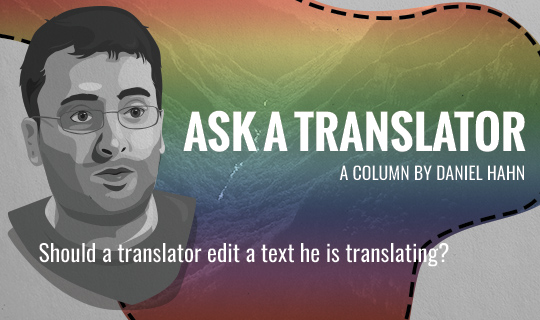We’re bringing you the latest meditations on translation from acclaimed author, editor and translator Daniel Hahn. In “Ask a Translator,” he answers burning questions from readers about the gritty details of his chosen career. Today Daniel responds to Asymptote reader Tony Liang from Beijing, China.
Do you think the translator should be allowed to edit the text he translates?
It is not my job to change a text I’m translating. Indeed, my aim at its most essential is exactly the opposite: to focus all the ingenuity I have on figuring out specifically how to change nothing, how to give my publisher precisely the book we started with—not abridged or corrected or improved, but my best attempt at keeping it just the same, the language changed but nothing else. To rewrite the text in entirely new words while seeking to have as little of my own collateral effect on it as I possibly can. Leaving aside the fact that that’s impossible (because even as it keeps things the same, the process of translation is also changing everything), that’s the intention, that’s what we like to pretend is happening. Maintaining structural, narrative, tonal integrity, if you like, and faking it with all the rest.
In normal circumstances, then, it’s not my job to make the book better. It’s not my job to make the book more palatable to a reader. It’s not my job to fact-check a book and correct its mistakes and inconsistencies. My job is to write the same book. That’s the general idea.
But in practice that hard line doesn’t really apply. Every book can be improved, so when presented with an opportunity to do so, why not take it?
Editing practices vary drastically between one publishing culture and another. There are relatively few places where the process is as robust as it is in the English-speaking world. I have writer friends in many countries whose books are barely more than spell-checked between being delivered to the publisher and sent off to the presses. Nobody will read the manuscript critically, carefully, questioningly, to figure out what it needs, treating it as a still malleable draft, before coming back to the author with major observations and suggestions. (Chapter 7 slows the action down, the subplot in the second half is distracting, the character of the older son could do with a bit of fleshing out, some of the dialogue in the classroom scene is a bit ropy, if this is a whodunit the ending is maybe a bit too predictable, if this is a comedy I’m afraid the jokes aren’t yet, um, quite funny enough…) Even great writers can benefit from the observations of clever, fresh-eyed first readers, and fundamentally that’s what editors are.
So when this doesn’t happen, the English-language publication can sometimes offer a second shot at getting this right.
But as a translator I never make these decisions myself. Whether editorial interventions are necessary usually depends on the editor; whether they are permissible depends on the author. I will sometimes weigh in—I might suggest a cut or a rearrangement when I’ve felt something amiss as I’ve made my way through it—but it’s never my ultimate call.
Sometimes, of course, it’s not a question of making the book better per se—making it more coherent or clear or improving the flow or the shape—merely better suited to our new readership. A historical novel I translated became a dozen pages shorter in its passage to English, losing its long epilogue detailing the latter lives of the real historical characters, because the publishers felt it could only be of interest to Spanish readers. (I argued with this decision, for what it’s worth, on structural grounds.)
Edits on a smaller scale do sometimes take place at my instigation (though again with the editor’s approval and the author’s)—if I find a factual mistake, for example, or a moment in the writing that might have suited an original reader that mine might find problematic in one way or another. And a writer is often grateful for the opportunity to do some light tidying. Not always, of course (don’t ask…), but often—grateful to have at least the book’s minor infelicities or inconsistencies or inadvertent ambiguities pointed out to them, so that they can be cleaned up before the next wave of readers get their hands on it.
I’ve corrected facts in non-fiction books, or nearly-but-not-quite quotations. I’ve cleared up points of inconsistency that really should have been caught first time around: photos that are in colour when we first hear of them and then twenty pages later are miraculously in black and white; a one-way street that seems to go one way in two different directions, etc. I’ve toned down some things that might have had faintly racist overtones to my Anglophone readers (a book for children, so the question of what is or isn’t palatable is even more loaded). Things of that nature. And oh, of course, every time I’ve translated a book I’ve replaced all the author’s words with new ones. But apart from that…
For more insights from Daniel, check out this compilation of our favorite bits of translation wisdom from his past columns. Send us any questions you have for Daniel about language, translation, or the ‘curious composite’ of world literature to askatranslator@asymptotejournal.com!
*****
Read More from Daniel Hahn:
- Ask a Translator: What Can a Translator Do to Improve?
- Ask a Translator: The Best Tips
- Ask a Translator: Is there anything completely untranslatable?

